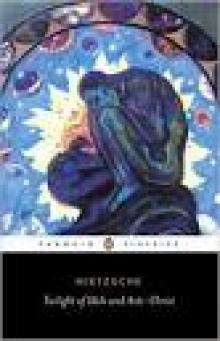- Home
- Friedrich Nietzsche
The Portable Nietzsche Page 19
The Portable Nietzsche Read online
Page 19
A sultry heart and a cold head: where these two meet there arises the roaring wind, the “Redeemer.” There have been greater ones, verily, and more highborn than those whom the people call redeemers, those roaring winds which carry away. And you, my brothers, must be redeemed from still greater ones than all the redeemers if you would find the way to freedom.
Never yet has there been an overman. Naked I saw both the greatest and the smallest man: they are still all-too-similar to each other. Verily, even the greatest I found all-too-human.
Thus spoke Zarathustra.
ON THE VIRTUOUS
Slack and sleeping senses must be addressed with thunder and heavenly fireworks. But the voice of beauty speaks gently: it creeps only into the most awakened souls. Gently trembled and laughed my shield today; that is the holy laughter and tremor of beauty. About you, the virtuous, my beauty laughed today. And thus its voice came to me: “They still want to be paid.”
You who are virtuous still want to be paid! Do you want rewards for virtue, and heaven for earth, and the eternal for your today?
And now are you angry with me because I teach that there is no reward and paymaster? And verily, I do not even teach that virtue is its own reward.
Alas, that is my sorrow: they have lied reward and punishment into the foundation of things, and now also into the foundation of your souls, you who are virtuous. But like the boar’s snout, my words shall tear open the foundation of your souls: a plowshare will I be to you. All the secrets of your foundation shall come to light; and when you lie uprooted and broken in the sun, then will your lies also be separated from your truths.
For this is your truth: you are too pure for the filth of the words: revenge, punishment, reward, retribution. You love your virtue as a mother her child; but when has a mother ever wished to be paid for her love? Your virtue is what is dearest to you. The thirst of the ring lives in you: every ring strives and turns to reach itself again. And like a dying star is every work of your virtue: its light is always still on its way and it wanders—and when will it no longer be on its way? Thus the light of your virtue is still on its way even when the work has been done. Though it be forgotten and dead, the ray of its light still lives and wanders. That your virtue is your self and not something foreign, a skin, a cloak, that is the truth from the foundation of your souls, you who are virtuous.
Yet there are those for whom virtue is the spasm under the scourge, and you have listened to their clamor too much.
And there are others who call it virtue when their vices grow lazy; and when their hatred and jealousy stretch their limbs for once, then their “justice” comes to life and rubs its sleepy eyes.
And there are others who are drawn downward: their devils draw them. But the more they sink, the more fervently glow their eyes and their lust for their god. Alas, their clamor too has reached your ears, you who are virtuous: “What I am not, that, that to me are God and virtue!”
And there are others who come along, heavy and creaking like carts carrying stones downhill: they talk much of dignity and virtue—they call their brake virtue.
And there are others who are like cheap clocks that must be wound: they tick and they want the tick-tock to be called virtue. Verily, I have my pleasure in these: wherever I find such clocks, I shall wind and wound them with my mockery, and they shall whir for me.
And others are proud of their handful of justice and commit outrages against all things for its sake, till the world is drowned in their injustice. Oh, how ill the word virtue comes out of their mouths! And when they say, “I am just,” it always sounds like “I am just—revenged.” With their virtue they want to scratch out the eyes of their enemies, and they exalt themselves only to humble others.
And then again there are such as sit in their swamp and speak thus out of the reeds: “Virtue—that is sitting still in a swamp. We bite no one and avoid those who want to bite; and in all things we hold the opinion that is given to us.”
And then again there are such as love gestures and think that virtue is some kind of gesture. Their knees always adore, and their hands are hymns to virtue, but their heart knows nothing about it.
And then again there are such as consider it virtue to say, “Virtue is necessary”; but at bottom they believe only that the police is necessary.
And some who cannot see what is high in man call it virtue that they see all-too-closely what is low in man: thus they call their evil eye virtue.
And some want to be edified and elevated, and they call that virtue, while others want to be bowled over, and they call that virtue too.
And thus almost all believe that they have a share in virtue; and at the very least everyone wants to be an expert on good and evil.
Yet Zarathustra did not come to say to all these liars and fools: “What do you know of virtue? What could you know of virtue?”
Rather, that you, my friends, might grow weary of the old words you have learned from the fools and liars.
Weary of the words: reward, retribution, punishment, and revenge in justice.
Weary of saying: what makes an act good is that it is unselfish.
Oh, my friends, that your self be in your deed as the mother is in her child—let that be your word concerning virtue!
Verily, I may have taken a hundred words from you and the dearest toys of your virtue, and now you are angry with me, as children are angry. They played by the sea, and a wave came and carried off their toy to the depths: now they are crying. But the same wave shall bring them new toys and shower new colorful shells before them. Thus they will be comforted; and like them, you too, my friends, shall have your comfortings—and new colorful shells.
Thus spoke Zarathustra.
ON THE RABBLE
Life is a well of joy; but where the rabble drinks too, all wells are poisoned. I am fond of all that is clean, but I have no wish to see the grinning snouts and the thirst of the unclean. They cast their eye into the well: now their revolting smile shines up out of the well. They have poisoned the holy water with their lustfulness; and when they called their dirty dreams “pleasure,” they poisoned the language too. The flame is vexed when their moist hearts come near the fire; the spirit itself seethes and smokes where the rabble steps near the fire. In their hands all fruit grows sweetish and overmellow; their glance makes the fruit tree a prey of the wind and withers its crown.
And some who turned away from life only turned away from the rabble: they did not want to share well and flame and fruit with the rabble.
And some who went into the wilderness and suffered thirst with the beasts of prey merely did not want to sit around the cistern with filthy camel drivers.
And some who came along like annihilators and like a hailstorm to all orchards merely wanted to put a foot into the gaping jaws of the rabble to plug up its throat.
The bite on which I gagged the most is not the knowledge that life itself requires hostility and death and torture-crosses—but once I asked, and I was almost choked by my question: What? does life require even the rabble? Are poisoned wells required, and stinking fires and soiled dreams and maggots in the bread of life?
Not my hatred but my nausea gnawed hungrily at my life. Alas, I often grew weary of the spirit when I found that even the rabble had esprit. And I turned my back on those who rule when I saw what they now call ruling: higgling and haggling for power—with the rabble. I have lived with closed ears among people with foreign tongues: would that the tongue of their higgling and their haggling for power might remain foreign to me. And, holding my nose, I walked disgruntled through all of yesterday and today: verily, all of yesterday and today smells foul of the writing rabble.
Like a cripple who has become deaf and blind and dumb: thus have I lived for many years lest I live with the power-, writing- and pleasure-rabble. Laboriously and cautiously my spirit climbed steps; alms of pleasure were its refreshment; and life crept along for the blind as on a cane.
What was it that happened to me? How did I rede
em myself from nausea? Who rejuvenated my sight? How did I fly to the height where no more rabble sits by the well? Was it my nausea itself which created wings for me and water-divining powers? Verily, I had to fly to the highest spheres that I might find the fount of pleasure again.
Oh, I found it, my brothers! Here, in the highest spheres, the fount of pleasure wells up for me! And here is a life of which the rabble does not drink.
You flow for me almost too violently, fountain of pleasure. And often you empty the cup again by wanting to fill it. And I must still learn to approach you more modestly: all-too-violently my heart still flows toward you—my heart, upon which my summer burns, short, hot, melancholy, overblissful: how my summer-heart craves your coolness!
Gone is the hesitant gloom of my spring! Gone the malice of my snowflakes in June! Summer have I become entirely, and summer noon! A summer in the highest spheres with cold wells and blissful silence: oh, come, my friends, that the silence may become still more blissful!
For this is our height and our home: we live here too high and steep for all the unclean and their thirst. Cast your pure eyes into the well of my pleasure, friends! How should that make it muddy? It shall laugh back at you in its own purity.
On the tree, Future, we build our nest; and in our solitude eagles shall bring us nourishment in their beaks. Verily, no nourishment which the unclean might share: they would think they were devouring fire and they would burn their mouths. Verily, we keep no homes here for the unclean: our pleasure would be an ice cave to their bodies and their spirits.
And we want to live over them like strong winds, neighbors of the eagles, neighbors of the snow, neighbors of the sun: thus live strong winds. And like a wind I yet want to blow among them one day, and with my spirit take the breath of their spirit: thus my future wills it.
Verily, a strong wind is Zarathustra for all who are low; and this counsel he gives to all his enemies and all who spit and spew: “Beware of spitting against the wind!”
Thus spoke Zarathustra.
ON THE TARANTULAS
Behold, this is the hole of the tarantula. Do you want to see the tarantula itself? Here hangs its web; touch it, that it tremble!
There it comes willingly: welcome, tarantula! Your triangle and symbol sits black on your back; and I also know what sits in your soul. Revenge sits in your soul: wherever you bite, black scabs grow; your poison makes the soul whirl with revenge.
Thus I speak to you in a parable—you who make souls whirl, you preachers of equality. To me you are tarantulas, and secretly vengeful. But I shall bring your secrets to light; therefore I laugh in your faces with my laughter of the heights. Therefore I tear at your webs, that your rage may lure you out of your lie-holes and your revenge may leap out from behind your word justice. For that man be delivered from revenge, that is for me the bridge to the highest hope, and a rainbow after long storms.
The tarantulas, of course, would have it otherwise. “What justice means to us is precisely that the world be filled with the storms of our revenge”—thus they speak to each other. “We shall wreak vengeance and abuse on all whose equals we are not”—thus do the tarantulahearts vow. “And ‘will to equality’ shall henceforth be the name for virtue; and against all that has power we want to raise our clamor!”
You preachers of equality, the tyrannomania of impotence clamors thus out of you for equality: your most secret ambitions to be tyrants thus shroud themselves in words of virtue. Aggrieved conceit, repressed envy—perhaps the conceit and envy of your fathers—erupt from you as a flame and as the frenzy of revenge.
What was silent in the father speaks in the son; and often I found the son the unveiled secret of the father.
They are like enthusiasts, yet it is not the heart that fires them—but revenge. And when they become elegant and cold, it is not the spirit but envy that makes them elegant and cold. Their jealousy leads them even on the paths of thinkers; and this is the sign of their jealousy: they always go too far, till their weariness must in the end lie down to sleep in the snow. Out of every one of their complaints sounds revenge; in their praise there is always a sting, and to be a judge seems bliss to them.
But thus I counsel you, my friends: Mistrust all in whom the impulse to punish is powerful. They are people of a low sort and stock; the hangman and the bloodhound look out of their faces. Mistrust all who talk much of their justice! Verily, their souls lack more than honey. And when they call themselves the good and the just, do not forget that they would be pharisees, if only they had—power.
My friends, I do not want to be mixed up and confused with others. Some preach my doctrine of life and are at the same time preachers of equality and tarantulas. Although they are sitting in their holes, these poisonous spiders, with their backs turned on life, they speak in favor of life, but only because they wish to hurt. They wish to hurt those who now have power, for among these the preaching of death is still most at home. If it were otherwise, the tarantulas would teach otherwise; they themselves were once the foremost slanderers of the world and burners of heretics.
I do not wish to be mixed up and confused with these preachers of equality. For, to me justice speaks thus: “Men are not equal.” Nor shall they become equal! What would my love of the overman be if I spoke otherwise?
On a thousand bridges and paths they shall throng to the future, and ever more war and inequality shall divide them: thus does my great love make me speak. In their hostilities they shall become inventors of images and ghosts, and with their images and ghosts they shall yet fight the highest fight against one another. Good and evil, and rich and poor, and high and low, and all the names of values—arms shall they be and clattering signs that life must overcome itself again and again.
Life wants to build itself up into the heights with pillars and steps; it wants to look into vast distances and out toward stirring beauties: therefore it requires height. And because it requires height, it requires steps and contradiction among the steps and the climbers. Life wants to climb and to overcome itself climbing.
And behold, my friends: here where the tarantula has its hole, the ruins of an ancient temple rise; behold it with enlightened eyes! Verily, the man who once piled his thoughts to the sky in these stones—he, like the wisest, knew the secret of all life. That struggle and inequality are present even in beauty, and also war for power and more power: that is what he teaches us here in the plainest parable. How divinely vault and arches break through each other in a wrestling match; how they strive against each other with light and shade, the godlike strivers—with such assurance and beauty let us be enemies too, my friends! Let us strive against one another like gods.
Alas, then the tarantula, my old enemy, bit me. With godlike assurance and beauty it bit my finger. “Punishment there must be and justice,” it thinks; “and here he shall not sing songs in honor of enmity in vain.”
Indeed, it has avenged itself. And alas, now it will make my soul, too, whirl with revenge. But to keep me from whirling, my friends, tie me tight to this column. Rather would I be a stylite even, than a whirl of revenge.
Verily, Zarathustra is no cyclone or whirlwind; and if he is a dancer, he will never dance the tarantella.
Thus spoke Zarathustra.
ON THE FAMOUS WISE MEN
You have served the people and the superstition of the people, all you famous wise men—and not truth. And that is precisely why you were accorded respect. And that is also why your lack of faith was tolerated: it was a joke and a circuitous route to the people. Thus the master lets his slaves have their way and is even amused by their pranks.
But the free spirit, the enemy of fetters, the nonadorer who dwells in the woods, is as hateful to the people as a wolf to dogs. To hound him out of his lair—that is what the people have ever called “a sense of decency”; and against him the people still set their fiercest dogs.
“Truth is there: after all, the people are there! Let those who seek beware!”—these words have echoed through the a
ges. You wanted to prove your people right in their reverence: that is what you called “will to truth,” you famous wise men. And your hearts ever said to themselves: “From among the people I came, and from there too the voice of God came to me. As the people’s advocates you have always been stiff-necked and clever like asses.
And many who were powerful and wanted to get along smoothly with the people harnessed in front of their horses a little ass, a famous wise man.
And now I should wish, you famous wise men, that you would at long last throw off the lion’s skin completely. The skin of the beast of prey, mottled, and the mane of those who search, seek, and conquer.
Oh, to make me believe in your “truthfulness” you would first have to break your revering will.
Truthful I call him who goes into godless deserts, having broken his revering heart. In the yellow sands, burned by the sun, he squints thirstily at the islands abounding in wells, where living things rest under dark trees. Yet his thirst does not persuade him to become like these, dwelling in comfort; for where there are oases there are also idols.
Hungry, violent, lonely, godless: thus the lion-will wants itself. Free from the happiness of slaves, redeemed from gods and adorations, fearless and fearinspiring, great and lonely: such is the will of the truthful.
It was ever in the desert that the truthful have dwelt, the free spirits, as masters of the desert; but in the cities dwell the well-fed, famous wise men—the beasts of burden. For, as asses, they always pull the people’s cart. Not that I am angry with them for that: but for me they remain such as serve and work in a harness, even when they shine in harnesses of gold. And often they have been good servants, worthy of praise. For thus speaks virtue: “If you must be a servant, seek him who profits most from your service. The spirit and virtue of your master shall grow by your being his servant: then you yourself will grow with his spirit and his virtue.” And verily, you famous wise men, you servants of the people, you yourselves have grown with the spirit and virtue of the people—and the people through you. In your honor I say this. But even in your virtues you remain for me part of the people, the dumb-eyed people —the people, who do not know what spirit is.

 The Portable Nietzsche
The Portable Nietzsche Twilight of the Idols/The Anti-Christ
Twilight of the Idols/The Anti-Christ Thus Spoke Zarathustra
Thus Spoke Zarathustra Why I Am So Clever
Why I Am So Clever Beyond Good and Evil
Beyond Good and Evil Twilight of Idols and Anti-Christ
Twilight of Idols and Anti-Christ Twilight of Idols and Anti-Christ (Penguin Classics)
Twilight of Idols and Anti-Christ (Penguin Classics)